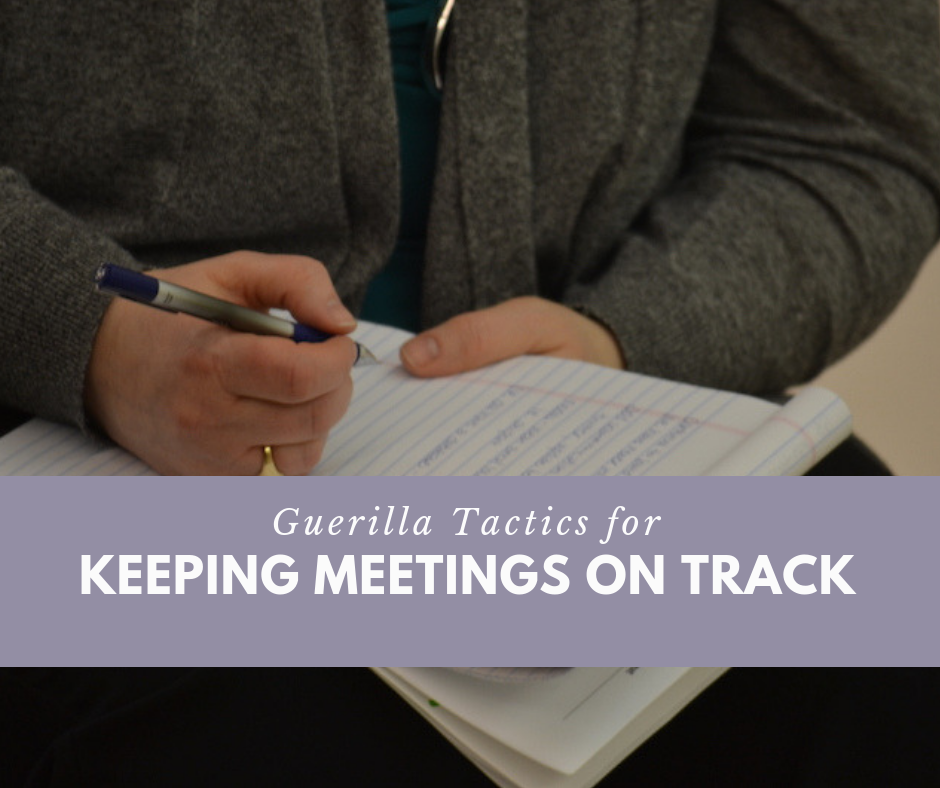|
Every meeting has the potential to veer into a tangent, to carry its attendees into a deep forest so far from the original path that it’s nearly impossible to find the route home. It’s easy to blame this on others – those who arrange the agenda, those whose comments lead us astray. But whether we like it or not, we are all accountable for keeping meetings effective. If you’re in charge, the steps you need to take are more obvious. If you’re not officially in charge, there are still things you can do to keep everyone on track. But wait, you say. I’m not the meeting leader. What can I do? A lot, it turns out. It can be uncomfortable to step in and say something. But if you don’t deploy some guerilla tactics, you’re actually rewarding bad meeting behavior. An easy way to bring people back to the meeting at hand is to use the power of curiosity: Ask questions instead of launching accusations.
Here are some specific ways to address some major meeting derailers. Keep these ideas in mind and you will move from a passive observer to problem solver – all while making your meetings better. Problem: Meeting starts without a purpose. Solution: When a meeting starts without a purpose, outcomes or products simply ask: “Can you take a second to go over the overall purpose of this meeting and what we need to have when we’re done? That information will help me stay focused.” Recognize we are all doing our best. Sometimes that best doesn’t come with a clear purpose. The meeting organizer may not know that meetings need purpose. They may not have had an opportunity to learn. Don’t be snarky, rude, or mean – ask the questions honestly and kindly. Problem: Discussion goes off track. Solution: This happens often in meetings, right? It usually goes something like this: Todd (and we all know Todd, we may have even been him!) has this great idea for new bedroom footwear, and he must share every single detail now. Great, except the meeting is about brainstorming nightwear for cats. When Todd goes off on his random tangent, speak up and say: “These are excellent ideas for slippers. I know we need to get back to our main topic, but your ideas may be important for a future meeting. I will write them down for future discussion. Can we get back to discussing number four on the agenda: cat pajamas?” Or use PAL (purpose, agenda, limit) to remind the group of the meeting’s purpose, the agenda items being addressed, and a time limit for discussion. Problem: One person dominates discussion. Solution: This situation can get sticky. If the person dominating the conversation is the official meeting leader, you might not be able to use the following technique. But if it’s a peer, chime in with a suggestion. Say something like: “This is an important point. Todd has shared his views, and it would be great to hear from everyone else. Can we go around the room?” Problem: Decisions and actions not documented Solution: It’s important to have somebody jotting down decisions and action points throughout the meeting. Even if these notes don’t turn into formal meeting minutes, they keep a group from spinning and having the same discussion every single time they meet. If the meeting leader isn’t capturing decisions, suggest that somebody serve as a Monkey Minder who takes notes. But if it’s too late for that, ask a question: “There have been decisions made here. Can we make sure someone is capturing those?” Or, step in and assign yourself the role: “There have been decisions made here. Is anyone officially writing these down? If not, I’d be willing to share my notes with the group.” Consider your tone and remember that we don’t share the same brain, urgencies, or priorities. The rambler, the dominator, and the wayward meeting leader are often doing what’s easy or natural. Take personal responsibility for your attention and actions in a meeting. Problem: Not paying attention in the meeting. Solution: Check in with yourself. Are you carrying emotions from another conversation or are you worried about something you’re missing? Are you present and taking responsibility for listening and contributing? Are you engaged, asking questions, and taking your own notes? Sadly, 98% of us can’t actually multitask. (Take this fun test to see how you do.) So if you’re texting, reading an article, or browsing the Internet during a meeting, you are not paying attention. Take a deep breath, put down your phone/laptop/tablet, grab a pen and take your own notes. The act of writing will help you pay attention to the meeting at hand. Keeping meetings on track isn’t easy, but it’s something anybody and everybody can help to do. Keep these guerilla tactics in mind during your next gathering, and you’ll have some control over keeping things efficient and on point. –Rachel
0 Comments
Your comment will be posted after it is approved.
Leave a Reply. |
Reach PartnersYour partners in leadership. Categories
All
Archives
July 2024
|
|
|
Reach Partners, Inc
3330 Fiechtner Dr. Suite 100 Fargo, ND 58103-2321 701-271-8170 Copyright (C) 2024 Reach Partners Inc.
|

